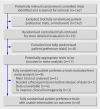Patients' preferences within randomised trials: systematic review and patient level meta-analysis
- PMID: 18977792
- PMCID: PMC2659956
- DOI: 10.1136/bmj.a1864
Patients' preferences within randomised trials: systematic review and patient level meta-analysis
Abstract
Objective: To systematically review fully randomised patient preference trials and to explore the impact of preferences on attrition and outcome by meta-analysis of patient level data.
Data sources: Citation search using Science Citation Index and Google Scholar and search of the main electronic databases (Medline, CINAHL, Embase, and AMED) with a combination of key words.
Study selection: Fully randomised patient preference trials that compared treatments for any clinical condition were included. Other types of preference trials and crossover trials were excluded. Other inclusion criteria: participants aged 16 years and over; primary, self-reported outcomes measured on a continuous numerical scale. From 167 studies identified and screened, 17 were identified as fully randomised patient preference trials.
Data synthesis: Of the 17 trials identified, 11 authors provided raw data for the meta-analysis. Data collected were baseline and follow-up data for the main outcome, randomised allocation data, preference data, and demographic data. Baseline and first post-intervention follow-up data for the main outcome were standardised. To improve homogeneity, data for only the eight musculoskeletal trials (n=1594) were combined. To estimate the effects of preferences on outcomes and attrition, three groups were compared: patients who had a preference and were randomly allocated to their preferred treatment; patients who had a preference and were randomly allocated to the treatment they did not prefer; and patients who had no preference.
Results: Patients who were randomised to their preferred treatment had a standardised effect size greater than that of those who were indifferent to the treatment assignment (effect size 0.162, 95% confidence interval 0.011 to 0.314; P=0.04). Participants who received their preferred treatment also did better than participants who did not receive their preferred treatment (effect size 0.152, -0.035 to 0.339), although this was not statistically significant (P=0.11). Participants allocated to their undesired treatment had outcomes that were no different from those who were indifferent. Participants who were allocated to their undesired treatment were less likely to be lost to first follow-up compared with indifferent participants (odds ratio 1.70, 1.076 to 2.693; P=0.02). No difference was found in attrition between patients allocated to their preference and those who were indifferent.
Conclusions: Preferences among patients in musculoskeletal trials are associated with treatment effects. In open randomised trials, preferences should be ascertained before randomisation.
Conflict of interest statement
Competing interests: None declared.
Figures
Comment in
-
Do patients' preferences matter?BMJ. 2008 Oct 31;337:a2034. doi: 10.1136/bmj.a2034. BMJ. 2008. PMID: 18977793 No abstract available.
References
-
- Pocock SJ. Clinical trials: a practical approach. Chichester: John Wiley and Sons, 1983.
-
- Howard L, Thornicroft G. Patient preference randomised controlled trials in mental health research. Br J Psychiatry 2006;188:303-4. - PubMed
-
- King M, Nazareth I, Lampe F, Bower P, Chandler M, Morou M, et al. Impact of participants and physician intervention preferences on randomised trials: a systematic review. JAMA 2005;293:1089-99. - PubMed
Publication types
MeSH terms
Grants and funding
LinkOut - more resources
Full Text Sources

